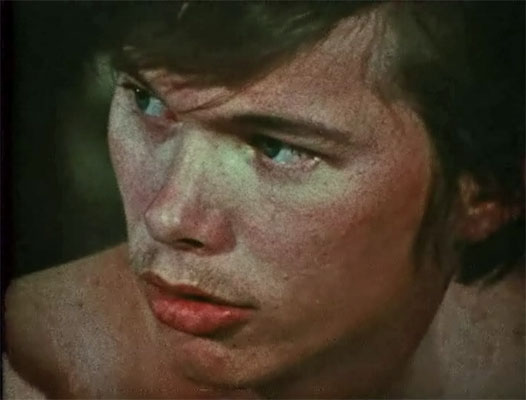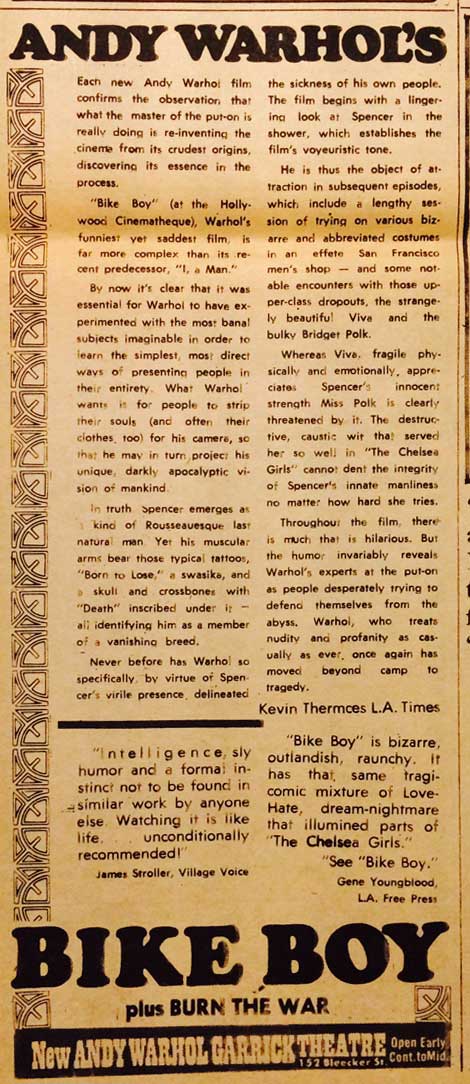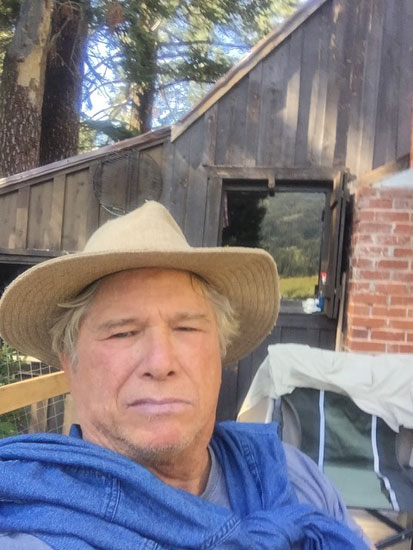Interview with "Julian Burroughs"
Gary Comenas

Andrew Dungan (aka Julian Burroughs) in Andy Warhol's film, The Nude Restaurant (1967)
Andrew Dungan appeared in a number of films directed by Andy Warhol including The Nude Restaurant, Lonesome Cowboys, footage shot for **** (Four Stars) and possibly L'Amour. He was credited in the films as "Julian Burroughs" - a name he adopted after deserting from the U.S. Army during the Vietnam War. He was born on February 13, 1945 in Exeter, California, in the San Joaquin Valley, where his family has lived since 1893.
This interview took place via email from October 7, 2015 to October 22, 2015.
Gary Comenas (Warholstars): How did you come up with the name of Julian Burroughs?
Andrew Dungan (Julian Burroughs): I was drafted [into the U.S. Army] after my junior year but my plan had always been to leave for France where I would live in exile until the [Vietnam] war ended and write the great American novel. I was pressured into enlisting by my family but realized I couldn't spend the rest of my life feeling as though I had compromised my conscience so I deserted after 9 months, which is why I created the persona of Julian Burroughs, an homage to a man whose writing was inspirational for me and a way to perhaps get away if I was ever arrested for anything. "Julian" was from a novel by Gore Vidal that I knew was pretty much the same pronunciation in both English and French and "Burroughs" was an homage to William Burroughs whose work I greatly admired, although trying to find the final fix that he talks about almost killed me.
GC: Did you ever meet Billy Burroughs - the real son of William Burroughs? Or his father?
Andrew: Oddly enough, I did meet Billy who was a friend of my brothers. They had both been on the fishing boat in Alaska described in Kentucky Ham and he came to the family ranch at one point. I met William Burroughs at an exhibition of the paintings of a friend of mine in Los Angeles and was able to tell him of my appropriation of his name and the reasons why, which he found very amusing. It was mainly a way to buy some time if I was stopped by the police as it would be difficult to contact the family, but obviously it was a great help when I met Warhol. When they learned I wasn't the real son, they too appreciated my deception.
GC: How did you meet Andy Warhol?
Andrew: I attended the march on the Pentagon in October of 1967 [October 21, 1967] and later that month, Halloween day to be exact, I saw a person I recognized as Andy Warhol approaching me as I was walking down a street in New York City. I was surprised and somewhat fearful when Paul Morrissey asked if I wanted to be in a movie, somewhat homophobic I suppose, not sure what was up. They believed me initially when I said I was William Burroughs’ son, but also liked that I had put them on once they knew it wasn’t true.
GC: What other Warhol films were you in besides The Nude Restaurant and Lonesome Cowboys?
Andrew: I made Burn the War, a short included in **** (Four Stars) and I might have a part in L'Amour, filmed in Paris in 1970 or so. I've never seen it.
GC: Can you tell me more about Burn the War? It's mentioned at the bottom of an ad for a screening of Bike Boy in the Village Voice:

Village Voice ad, 18 July 1968
Warhol Film Ads
Andrew: Burn the War was a short piece that allowed the artist Lil Picard, a longtime friend of Andy's to show her "constructionist" art. She washed the American flag behind me as I spoke about what was wrong with America, a sort of half hour rambling speech.
GC: It's interesting that the Village Voice ad for Bike Boy is the only screening I've found for Burn the War as a film in itself rather than footage in **** (Four Stars). Joe Spencer in Bike Boy always reminds me of Tom Baker in I, A Man who was a friend of Jim Morrison and died of an overdose. Did you ever know Tom?
Andrew: I did not know Tom in NYC but when I was in LA in the early '80s I met him through Louis Waldon. Tom was incredibly charismatic, handsome, funny, and could be short-tempered. He sort of drank himself out of a potentially big career as an actor, but I guess, he like so many others, took too much heroin in a shot, ending up dead on the stage of an acting class in New York. Great loss.
GC: He overdosed on stage? Ultra Violet wrote in her biography that he died in a shooting gallery in the Lower East Side. Do you remember the year or who his acting coach was?
Andrew: Can't remember the name of the acting coach but Tom stayed at his studio when he was in New York and overdosed on a chair, one night not during a class. Probably in 1983-84.
GC: Most people at the Factory seemed to be into amphetamine. What was your drug of choice during the '60s?
Andrew: My drug of choice, unfortunately for me, was anything I could get my hands on. I remember that after making [The] Nude Restaurant we all went to a party in a club and Keith [Richards] and Mick [Jagger] were there and Keith opened the knob in his walking stick and Viva and I snorted up some powder which was either coke or amphetamine. I was also introduced to heroin by Ingrid Superstar. So I was very prone to drug abuse although in the end it was alcohol that made me hit my bottom and get sober.
GC: When you appeared in The Nude Restaurant, was Andy Warhol behind the camera? Or was it Paul Morrissey? Were there any directions from Warhol or Morrissey about what you should be saying or doing on screen?
Andrew: Andy Warhol was behind the camera. I thought this would be a one-night experience so I talked about the war and the draft resistance in case someone I knew might see it. I tweaked it to mesh with Taylor's interest in young men, so it sort of worked on two levels.
GC: Did Warhol operate the camera in Lonesome Cowboys or was it Paul Morrissey? Did you get the feeling that Warhol was directing the film or Morrissey?
Andrew: Andy had a switch on the tripod of the camera that he could switch on and off to stop the recording, but the actors couldn't tell if they were being filmed or not and Andy turned the movie on and off as the scene captured his interest or didn't. So there was a lot of playing to the camera, to Andy. So Andy definitely was the director. I think Paul had the idea for a western and I came up with a western version of Romeo and Juliette, to be called Ramona and Julian, hoping for a starring role. Often scenes have a hidden agenda to send a message out to friends and family as I was not sure I would ever see them again.
GC: Were you particularly friendly with any of the other actors in Lonesome Cowboys? What was it like working with Louis Waldon, Taylor Mead, Eric Emerson or Viva?
Andrew: My closest connection was with Louis Waldon who was also a California boy and I connected him later after my return from Paris and we were close for awhile until my marriage brought an end to my wilder days. I met up with Joe D'Allesandro when he came out to L.A. and am in contact with Viva. She was and still is a very witty and wise woman. Eric Emerson was such a brilliant guy who knew how to get Andy's attention and was one of the best things about Lonesome Cowboys, such a great guy, so saddened by his death. Sorry too about Taylor, but he lived on for quite awhile.
GC: When you said earlier that you weren't sure that you would see your friends and family again, do you mean because you left the states to avoid being charged as a deserter? Can you give me some idea of your family background and why you decided to go into exile?
Andrew: I was raised in a small town in California but my parents wanted me to have a more worldly view so we travelled and between high school and college I spent a year at a post-graduate program in Switzerland, studying and travelling around the continent. I started at Stanford University in 1963, two months before JFK was assassinated and the school went through a lot of changes at that time with civil rights struggles, anti-war protests, and the cultural changes with feminism, music, drugs, etc.
In college I was involved in The Resistance which was a group opposed to conscription, led by David Harris who eventually went to jail for refusing to be drafted and was married to Joan Baez for a time. It was very intense back then as so many young men were being forced to make decisions. I always believed that since the war was illegal, they had really no legal means to force you into the army. I had friends who went to jail, others who were conscientious objectors, but my choice was exile and thinking that if the US would not end the war and allow me to return, then it was probably not a good country to be in anyway.
GC: Can you break down your movements by year?
Andrew: I was in the San Francisco area at Stanford from 1963 through 1967, with a brief departure to the Army in Hawaii from 9/66 to 6/67. Then I went to the march on the Pentagon in October 1967, met Andy on Halloween, hung around the Factory and went out to Tucson for Lonesome Cowboys, hung around the Bay Area for awhile, then back to NYC, and in April 1968, flew to Paris where I lived until November 1974. After Lonesome Cowboys, Andy mentioned that I was a deserter in an interview I think, and the FBI went to the Factory, but I was also so paranoid being in the United States, fearful of being arrested.
GC: While you were in the states did you ever meet Allen Ginsberg or any of the other Beats?
Andrew: Had an incredible weekend with Neal Cassady in Big Sur with him driving my car around the curves, all of us on LSD and speed, and was involved with the acid trips put on by Kesey and the Merry Pranksters and knew the Grateful Dead when they were the Warlocks, as well as other San Francisco bands of the period - was at Monterey Pop and saw Hendrix and Ravi Shankar.
Neal Cassady was definitely a character with a constant stream of commentary in a low tone as he surveyed the world around him. Stanford was a focus of the San Francisco scene - Ken Kesey, the Grateful Dead, were all living in the Palo Alto area. Can't remember how we hooked up but we [Neal and Andrew] decided to drive down to Big Sur in my Mustang, probably in 1965. We ended up at a place full of speed freaks and one of them took an interest in the girl I was with. She had taken LSD and we had to leave the house so that the guy would leave her alone. Strange night and we all got up in the morning and somehow made it back to Stanford. Sweet man, Neal.
GC: Where did you live in San Francisco and New York?
Andrew: In San Francisco I really lived down the peninsula in Palo Alto/Stanford, couch surfing at various apartments when I was AWOL from the army. Previously I lived in a very progressive fraternity and in my own apartment in East Palo Alto. In New York, I slept here and there until I moved in with a girl who was studying at Bennington and doing a semester at Julliard, so she had a place uptown off Broadway near Julliard.
GC: Can you tell me a bit more about your time in Paris? Were American deserters welcome in Paris?
Andrew: In Paris we were allowed to live in exile but could not become involved in politics, so I had to be careful. I did attend a sort of fund-raiser for the NLF and saw a skit which showed me very clearly that the Vietnamese people were willing to fight to the death for their country. Actually it was Leonard Boudin, a well-known anti-war lawyer, who showed me the loophole that meant I could be discharged from the Army and not have to do any civilian service.
GC: Did you appear in any films in France?
Andrew: I made a couple of films in France. My connection with Andy served as a sort of opening to a scene in Paris.
GC: You mentioned that you might have been in L'Amour. Did Warhol film you when he was shooting the movie in Paris?
Andrew: They did shoot a scene with me behind Notre Dame one night. I was holding the microphone underneath a cape I was wearing and a car cut between the scene and the bus where the camera was recording. The microphone was ripped away as the car passed over the cable. Somehow I had only held the protective cover with thumb and finger. Had I gripped it more tightly, it would have probably torn my fingers off. I can't remember how I knew they were coming, or in fact how I caught up with them, but there was some connection and I remember meeting Andy at Karl Lagerfeld's apartment where they were filming. He pulled several $100 dollar bills out of the watch pocket of his jeans and gave them to me. So, I may be one of the few who actually got paid for working in an Andy Warhol film.
GC: Did you have family in Paris? How did you manage to return to the states, given that you were a deserter?
Andrew: In Paris I soon settled down with a woman and in 1972 we had a son and in 1974, as part of the Nixon pardon for Watergate, I was allowed to return to the U.S., receive an undesirable discharge, and go about my business. I visited Andy who was happy to see me but this was after the shooting and the world around him was much more subdued and secure. I went back to California, settled into Los Angeles, got my SAG card, and thought I would be an actor, but of course I was still a bit of a dreamer and the reality was, I had no clue. My drinking impacted on my marriage. My wife and I separated and later divorced. I went to work on the family ranch, planting trees, irrigating, tractor-driving. I got sober there in 1979, returned to L.A. in '81, started working as a drug and alcohol counselor, met my current wife at a treatment program where we both worked, returned to school, got my BA, then my MS in Educational Psychology and worked as a school psychologist for 20 years. Recently retired, I am now working on a project at the family ranch where my wife and I spend a lot of weekends. I own property where we grow oranges, lemons, pomegranates, and avocados. I have three sons, one of whom is a film producer, the others are recent college graduates who work at Boeing and Turner Broadcasting. I also have three grandchildren. I just turned 70 this year.
GC: Do you miss the 60s?
Andrew: I miss being young in the 60s, although I took too many risks and things could have turned out very differently. But I'm proud that I did not compromise my convictions which of course have been validated by history although the government still refuses to learn from the lessons. The 60s changed things in many way. But I am excited by right now, with life, with knowing what I know now. Took my wife and children to Paris recently and showed them my city of exile and I think my sons respected me for doing what I did at the same age they were now. So, it all comes around.

Andrew Dungan (aka Julian Burroughs), Summer 2015
[end]
Gary Comenas, 2015, warholstars.org